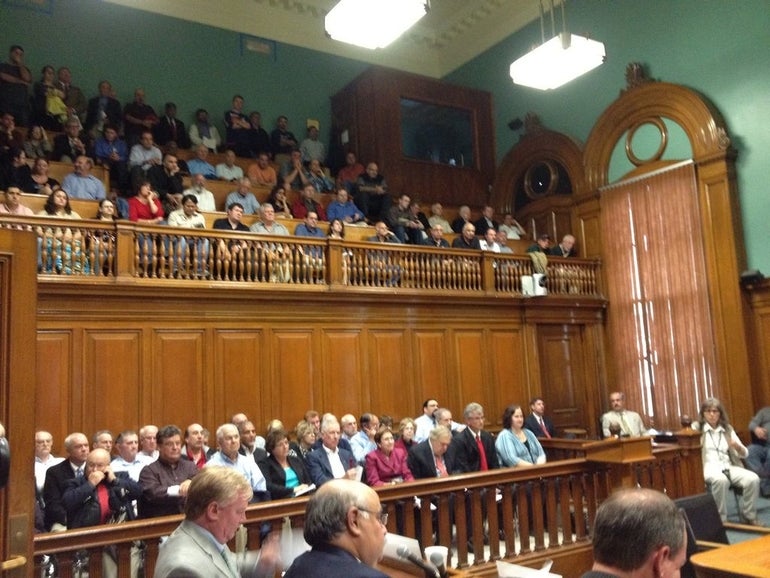Setting the tax rates for fiscal year 2012 last night, the Worcester City Council lessened the divide between residential and commercial-industrial rates.
After hearing about 20 citizens and business owners who filled the council’s chambers to voice their concerns, the council, in a 6-5 vote, moved to accept a new tax rate of $16.98 per $1,000 of value for residential properties and $29.08 for commercial-industrial. According to assessors, it would raise the average homeowner’s tax bill by 1.7 percent, or $56 per year, and the average commercial property owner’s by 4.72 percent, or $755.
The 2011 residential tax rate was $16.06 per $1,000 assessed valuation, while the commercial-industrial rate was $34.65.
Although the tax rate is dropping for property owners, it’s likely more will pay more taxes anyway. Some assessed values have skyrocketed, with more than half of the city’s commercial and industrial properties’ values going up more than 20 percent.
Many who spoke asked for the Worcester Regional Chamber of Commerce’s endorsed rate of $17.18 for residential and $28.56 for commercial-industrial.
Worcester resident John Merrill, president of Fidelity Bank, asked the council not to put the city at a “competitive disadvantage” and asked that it support the chamber’s request.
“That is fair and I think that is what the city needs to do to keep the momentum going,” he said.
Although not what the chamber endorsed, business leaders recognized what they see as a move in the right direction for the city with the new rates.
“I think we made a lot of progress in terms of having a more equitable solution,” said chamber President Dick Kennedy. He told the council that if taxes were to keep going up on businesses and the city lost 25 percent of its businesses over the next five years, it would add $500 to the average homeowner’s bill.
His group had advocated for business owners to appear at the council meeting, saying to, “Show up or pay up,” meaning that if they didn’t show up and explain the damage high taxes will do to their businesses, they would end up paying higher rates.
The approved rates were proposed by Mayor Joseph Petty and are a middle ground between the chamber and council members who sought to keep residential rates lower. Voting with the mayor were Councilors-At-Large Frederick Rushton, Kathleen Toomey, Joseph O’Brien and Michael Germain and District 1 Councilor Tony Economou.
Petty told the crowd – which spilled into the hall where a large TV was broadcasting the meeting – that the debate over how to split the tax rate happens every year.
“This city council gets it,” he said. He said the council “recognizes the burden being placed on the business community.”
Ending Dual Rates
For more than an hour, residents and business owners expressed their concerns and opinions. Many said pitting businesses and residents against one another through dual tax rates has to end.
Robert Seder, chair of the Worcester Business Development Corp. (WBDC), urged the council to close the gap in tax rates. He said he spoke with a manufacturer looking to lease space who refused to go to Worcester.
“This was very discouraging to me. What do I say to WBDC about investing in Worcester?” he asked. He said the 28-year “experiment” in dual tax rates has not been “particularly productive.”
Roberta Schaefer, of the Worcester Regional Research Bureau , said the city needs to phase in one tax rate and that it’s “the only way to avoid this perennial battle.” She said one rate would encourage businesses to stay, grow and hire in Worcester and less tax incentives would be needed to retain them.
“We need to develop a plan that would not only unite us, but transform the city,” she said.
Beth Proko, of Worcester Citizens for Business, was satisfied with the outcome, saying “It certainly was better than it could have been.” She said the annual tax arguments between business owners and homeowners don’t help the city.
“It really prevents us from coming up with real solutions to move forward,” she said.
Differing Opinions
District 4 Councilor Sarai Rivera, District 3 Councilor George Russell, Councilor-At-Large Konstantina Lukes and District 2 Councilor Philip Palmieri voted for other options in favor of lower rates for homeowners. District 5 Councilor William Eddy refused to back any options, saying he couldn’t justify raising anyone’s taxes.
Lukes, who has traditionally voted for the lowest residential rates, said this was probably the most controversial tax classification hearing she’d taken part in as a result of the revaluations but that it was difficult for her to understand how an elected official cannot vote to protect a homeowner. She said this year’s higher commercial assessments showed that businesses’ taxes had been too low for years and homeowners took on more of the burden than they should have.
But most councilors agreed that helping businesses stay in Worcester would help residents too.
“Something really has to be done to support the business community,” Economou said. He requested a report on the costs of starting and running a business in Worcester and agrees that the city should move toward a single tax rate. He commended the council for its efforts toward fair rates.
“I think everybody thought this process through and is making the best decision for the city as a whole.”
In voting with the mayor, he said, “I think this is a fair vote. I think this is the right thing to do.”
Read more

